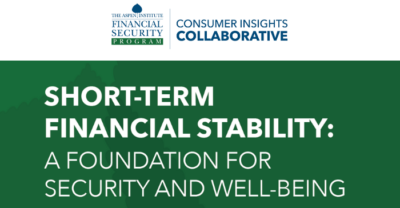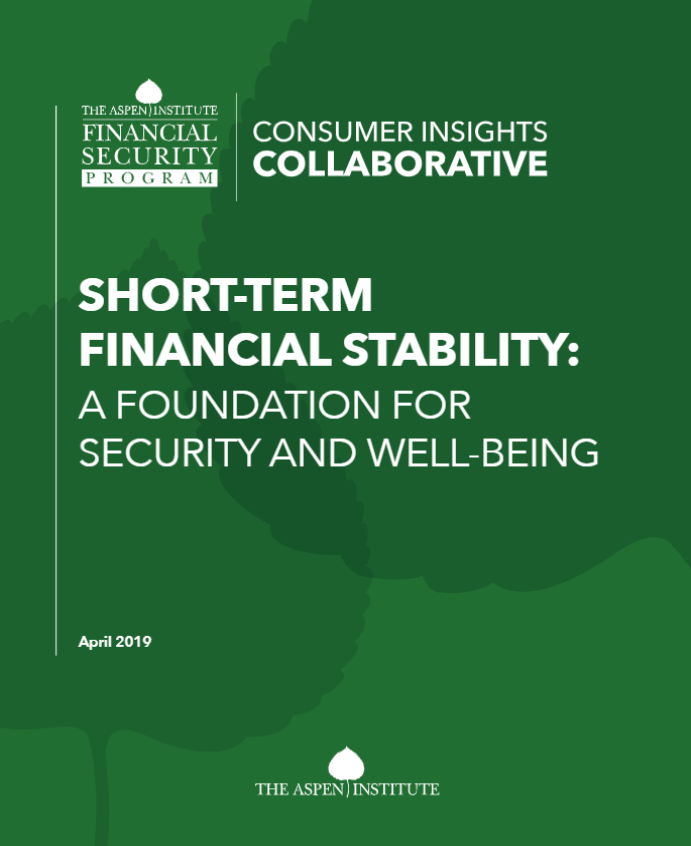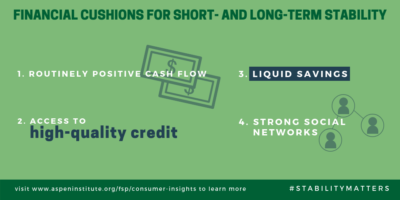Many programs and policies supporting financial well-being for consumers rightly prioritize long-term security. However, short-term financial stability provides the foundation from which financial security, and eventually economic mobility for the next generation, is built. ![]() This report shines a light on the central role that short-term financial stability plays in a person’s ability to reach broader financial security and upward economic mobility, a measurement of whether an individual moves up the economic ladder over one’s lifetime or across generations. Short-term financial stability means having enough of a financial cushion, broadly defined, to cope with everyday financial shocks, while still progressing towards financial goals.
This report shines a light on the central role that short-term financial stability plays in a person’s ability to reach broader financial security and upward economic mobility, a measurement of whether an individual moves up the economic ladder over one’s lifetime or across generations. Short-term financial stability means having enough of a financial cushion, broadly defined, to cope with everyday financial shocks, while still progressing towards financial goals.
CLICK HERE TO VIEW THE FULL REPORT
In this report we focus on four types of financial cushions:
- Routinely positive cash flow (income that exceeds expenses)
- Liquid savings (such as cash and money held in checking and savings accounts)
- Access to high-quality credit
- Strong social networks
While it’s intuitively clear that the availability of such resources can prevent immediate material hardship, it may be less broadly understood that short-term cushions are also key to longer-term financial security and well-being.![]() Stability promotes security because financial buffers protect consumers from shocks that would detract from progress toward their long-term goals, act as material foundations for growing assets, and reinforce the financial actions that move people towards broader well-being.
Stability promotes security because financial buffers protect consumers from shocks that would detract from progress toward their long-term goals, act as material foundations for growing assets, and reinforce the financial actions that move people towards broader well-being.
The insights presented in this report draw primarily on evidence provided by members of the Consumer Insights Collaborative (CIC), a group of nine leading nonprofits across the United States convened by the Aspen Institute Financial Security Program. These diverse organizations offer a window into the financial lives of the low- and moderate-income individuals they serve. Together, their data highlight barriers to financial stability, the strategies that consumers use to boost short-term stability on their own, as well as the external supports that CIC members, through their front-line work, know can increase the success of consumers’ own efforts.
SHARE:
 New report from @AspenFSP’s Consumer Insight Collaborative finds short-term financial stability is the foundation for long-term financial stability and security. #StabilityMatters https://buff.ly/2uYD2PM
New report from @AspenFSP’s Consumer Insight Collaborative finds short-term financial stability is the foundation for long-term financial stability and security. #StabilityMatters https://buff.ly/2uYD2PM ![]()
Findings from the #AspenCIC indicate that financial security is out-of-reach for far too many LMI households. Learn more about a foundation for security & well-being. #StabilityMatters https://buff.ly/2uYD2PM ![]()
Short-term financial stability means having enough of a financial cushion to cope with everyday financial shocks, while still progressing towards financial goals. #StabilityMatters https://buff.ly/2uYD2PM ![]()
Consumers experience financial instability because of a lack of financial cushions — specifically: positive cash flows, liquid savings, & access to high-quality credit. #AspenCIC #StabilityMatters https://buff.ly/2uYD2PM ![]()




